Best Cheap Internet Providers of 2021
There may be some debate about whether or not broadband is a utility like water or electricity, but there’s no doubt that internet service is part of any household budget just the same. How much of your budget is reserved for internet service largely depends on which broadband providers are available in your area. Internet can certainly be expensive, but many broadband providers offer at least one cheap Wi-Fi plan starting at or below $50 a month.
If you’re shopping for affordable internet options, our list of the best cheap ISPs is a good place to start. Our featured providers were chosen for their high nationwide availability and customer-friendly perks such as unlimited data or low equipment costs and, of course, low plan pricing.
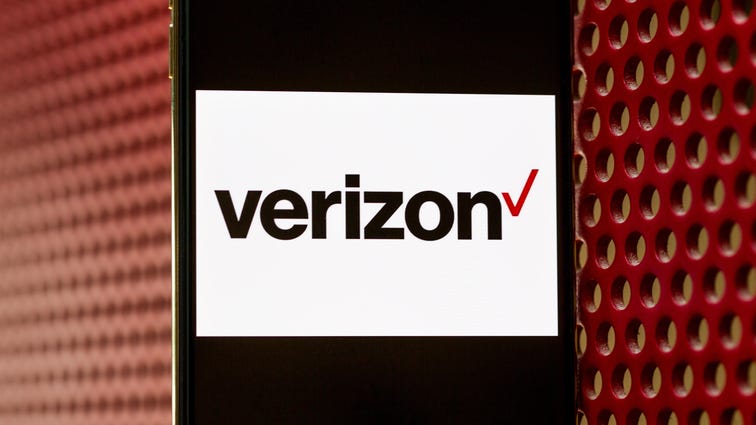
Angela Lang/CNET
Cheapest plan: Internet 200/200
- Plan details: $40 a month for up to 200Mbps
- Cost per Mbps: $0.20
- Wi-Fi equipment fee: $15 a month
- Expected all-in monthly cost: $55, plus taxes
Verizon’s lowest-priced Fios plan isn’t the cheapest on our list, but it does have the lowest cost per megabit per second, and offers the most speed for the price. It also comes with unlimited data and no contract requirements, as do all Verizon Fios plans.
At $15 a month, Verizon’s equipment rental fee is higher than most, but you have the option of avoiding the fee by using your own compatible equipment. Buying your own modem and router will cost more upfront but can save you money in the long run: Check out our recommended mesh routers for 2021.
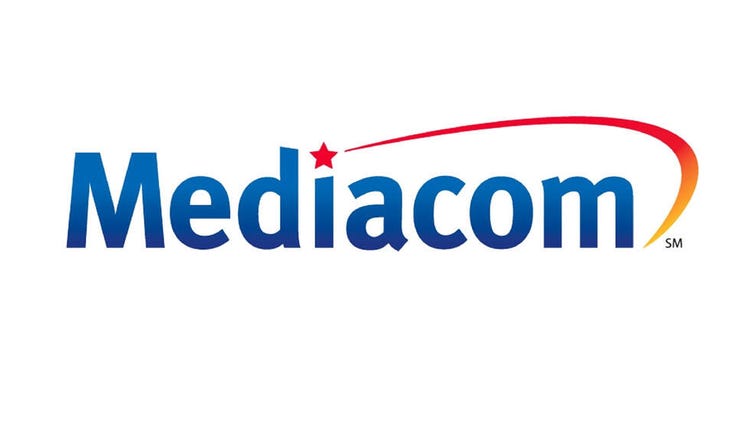
Mediacom
Cheapest plan: Access Internet 60
- Cheapest plan price: $20 a month for up to 60Mbps
- Cost per Mbps: $0.33
- Wi-Fi equipment fee: $12 a month
- Expected all-in monthly cost: $32, plus taxes
Mediacom doesn’t boast the same customer reach as larger cable providers such as Spectrum or Xfinity, but that can largely be attributed to its service areas. Residents of rural areas throughout the Midwest and South as well as parts of Arizona and California can rely on Mediacom for cheap broadband service starting at less than $20 a month.
The one downside to Mediacom’s cheapest Wi-Fi plan is the 60-gigabyte monthly data cap, which many households are likely to exceed (and incur an overage fee of $10 per 50GB block of data, up to a maximum of $50). Streaming HD video can use 3GB or more per hour, so streaming TV just a few hours a day can quickly put you over the cap. For more monthly data, consider higher-tiered Mediacom plans, which come with up to 6 terabytes a month.
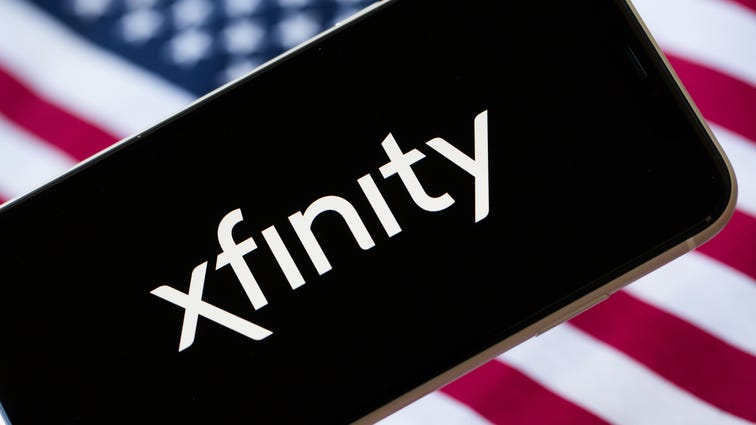
Angela Lang/CNET
Cheapest plan: Performance Starter
- Plan details: $25 a month for up to 25Mbps
- Cost per Mbps: $1
- Wi-Fi equipment fee: $14 a month
- Expected all-in monthly cost: $39, plus taxes
At $25 a month for up to 25Mbps, Xfinity’s Performance Starter isn’t the best internet deal you’re likely to find, but it is one of the more affordable broadband options available throughout much of the US.
If you’d like a little more speed, Xfinity offers two additional plans in the $50 a month range in select areas. Performance Select includes speeds up to 100Mbps starting at $35 a month. while Performance Pro comes with up to 200Mbps starting at $50 a month. You may be required to sign a one-year term agreement to get the lowest introductory pricing on these Xfinity plans or others. Opting for no contract could increase your bill by $10 a month for the first year.
Regardless of the Xfinity plan you choose, be prepared to keep your data usage under 1TB a month to avoid overage fees. Like Mediacom, Xfinity charges $10 per each 50GB block of data, but with Xfinity it could add a maximum of $100 to your bill.
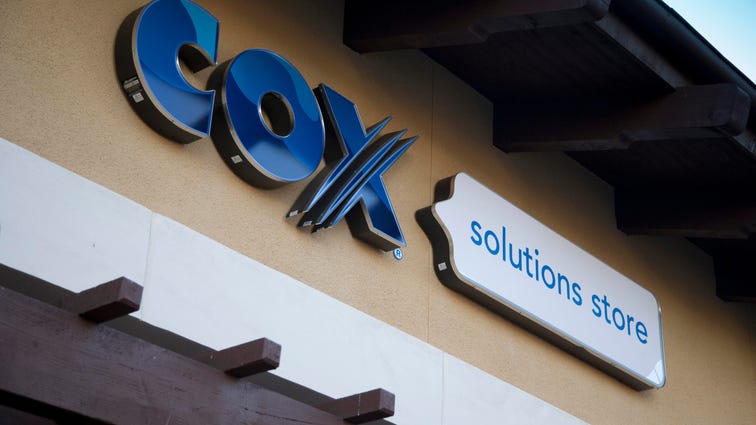
Tim Rue/Bloomberg via Getty Images
Cheapest plan: Internet Starter
- Cheapest plan price: $30 a month for up to 25Mbps
- Cost per Mbps: $1.20
- Wi-Fi equipment fee: $11 a month
- Expected all-in monthly cost: $32 plus taxes
There’s nothing overwhelming about the Internet Starter plan from Cox. It has the highest cost per megabit per second of any plan featured on our list of top providers, and in some areas only offers a max speed of 10Mbps.
Still, Cox made our list of the best cheap internet providers thanks to its prepaid service. For $50 a month, Cox StraightUp Internet comes with up to 25Mbps, a free router/modem device, free installation and a three-year price guarantee. The plan is ideal for those who may have less-than-perfect credit or simply want a pay-as-you-go service.
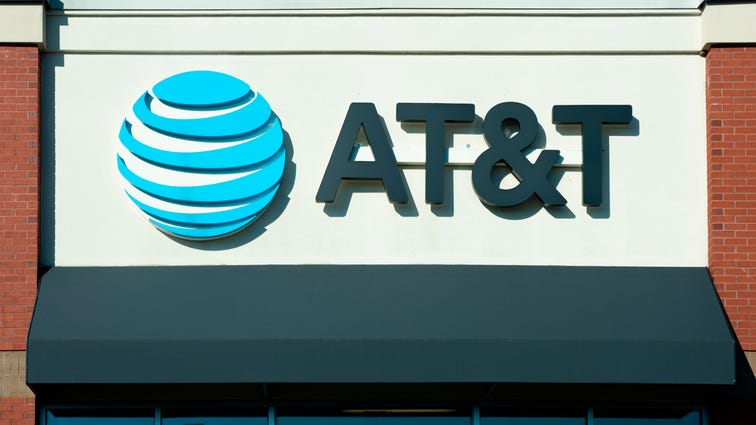
Jim Lane/Education Images/Universal Images Group via Getty Images
Cheapest plan: Internet 100
- Cheapest plan price: $35 a month for up to 100Mbps
- Cost per Mbps: $0.35
- Wi-Fi equipment fee: $10 a month
- Expected all-in monthly cost: $45, plus taxes
AT&T has the lowest starting price for fiber internet of any major provider. With unlimited data and a relatively low equipment rental fee of $10 a month, customers can get up to 100Mbps for an all-in price of around $45 a month. AT&T’s 300Mbps and gigabit plans are also competitively priced ($45 a month and $60 a month, respectively) compared to similar plans from other providers, fiber or otherwise.
Around 70% of households in AT&T internet service areas, however, are not eligible for AT&T Fiber. Cheap broadband service may still be available from AT&T, however, as its DSL-based service offers speeds up to 75Mbps starting at $40 a month.

Charter
Cheapest plan: Spectrum Internet
- Plan details: $50 a month for up to 200Mbps
- Cost per Mbps: $0.25
- Wi-Fi equipment fee: $5 a month
- Expected all-in monthly cost: $55 plus taxes
Spectrum has the highest-priced plan on our list, but the provider makes up for it with fast speeds and cheap Wi-Fi equipment fees. Spectrum internet service comes with a free modem and the router rental fee is only $5 a month.
With an all-in monthly price of around $55, speeds up to 200Mbps, unlimited data and no contracts, Spectrum Internet rivals Verizon Fios, our pick for the best overall cheap internet provider. Given the choice between the two, we’d recommend Verizon Fios as its 100% fiber connection provides faster upload speeds and better speed consistency than cable internet service from Spectrum.
Cheap internet honorable mentions
These national providers also have broadband service starting at or below $50 a month, but did not make our list of the best cheap ISPs due to high cost per megabit per second, inconsistent pricing or limited service areas.
- CenturyLink: CenturyLink has an exceptional price-for-life guarantee on its $49 a month. DSL service, but available speeds can vary widely from 3-100Mbps. If your address is only serviceable for less than broadband speeds (25Mbps download, 3Mbps upload or higher), CenturyLink’s cheapest plan may not be worth the cost, even with the price-for-life guarantee.
- Frontier Communications: Frontier FiberOptic internet starts at $50 a month with no additional fees for equipment or data. Max speeds are only 50Mbps, however, which is lower than you’ll find for around the same price from other providers.
- HughesNet: Satellite internet offers unrivaled availability, but the high latency and data caps that come with it make HughesNet’s Gen5 plan not worth the cost of $50 a month for speeds up to 25Mbps.
- Optimum: With speeds up to 300Mbps starting at $40 a month, Optimum is a great cheap internet option, but it’s only available in the greater New York City area.
- RCN: RCN offers plans as low as $22 a month for up to 25Mbps, but available pricing and speeds vary in every RCN market.
That’s all for our list of the best cheap internet providers. Read on for related information on low-income internet options, tips for shopping cheap internet providers and ways to save on your monthly bill.

Dial-up internet plans are still available for as little as $10 a month, but a cable or fiber connection will be worth the extra cost for almost everybody.
Jens Büttner/picture alliance/Getty Images
What’s the cheapest internet available?
Dial-up is the cheapest internet connection available, with plans starting under $10 a month from providers such as AOL, EarthLink and NetZero. In spite of the low cost, we wouldn’t recommend dial-up service. Dial-up speeds are painfully slow and will not support a Wi-Fi connection or nearly any online task more demanding than sending an email.
Another phone-based internet service, DSL is a popular go-to for cheap internet. Providers like Frontier and Verizon offer DSL plans ranging from $25-$35 a month, but these plans typically come with sub-broadband speeds.
Cable and fiber internet are likely to be your best cheap internet options. While plans can be a bit more expensive than dial-up or DSL service, the speeds and connection quality that you get are well worth the added cost.
Cheap internet options for low-income households
The Federal Communication Commission’s Lifeline program provides a monthly credit of up to $9.25 that qualifying consumers can apply towards their broadband bill. To qualify, applicants must have a household income at or below 135% of the Federal Poverty Guidelines, or qualify for other government assistance programs, including the Supplemental Nutrition Assistance Program, Medicaid, Federal Public Housing Assistance, Supplemental Security Income or the Veterans and Survivors Pension Benefit.
Many internet providers, including AT&T, Cox and Xfinity, also offer a discounted internet program. Plans typically cost between $5-$15 a month and come with speeds of 10-30Mbps. Qualifications are similar to those of the FCC’s Lifeline program.
Consider more than price when shopping for cheap internet
In addition to the sticker price, also be sure to consider:
- Speed: Will the lowest-priced plan deliver the speeds that you need? If not, you may want to explore other providers or upgrade to a more expensive plan.
- Added costs: Taxes are to be expected with any internet service, but added costs for equipment rental, data overages, installation and more will vary by provider.
- Contracts and price increases: Getting locked into a contract with your ISP can be costly, especially if the plan price increases before the service agreement is up. Canceling before the contract expires can also result in early termination fees.
How to save on my monthly internet bill
There are a few ways you may be able to get cheaper internet. Common ways to lower your internet bill include using your own equipment, negotiating a lower cost with your provider and switching providers.
View our guide on how to save on your internet bill for more details about how you can lower your monthly internet costs.






